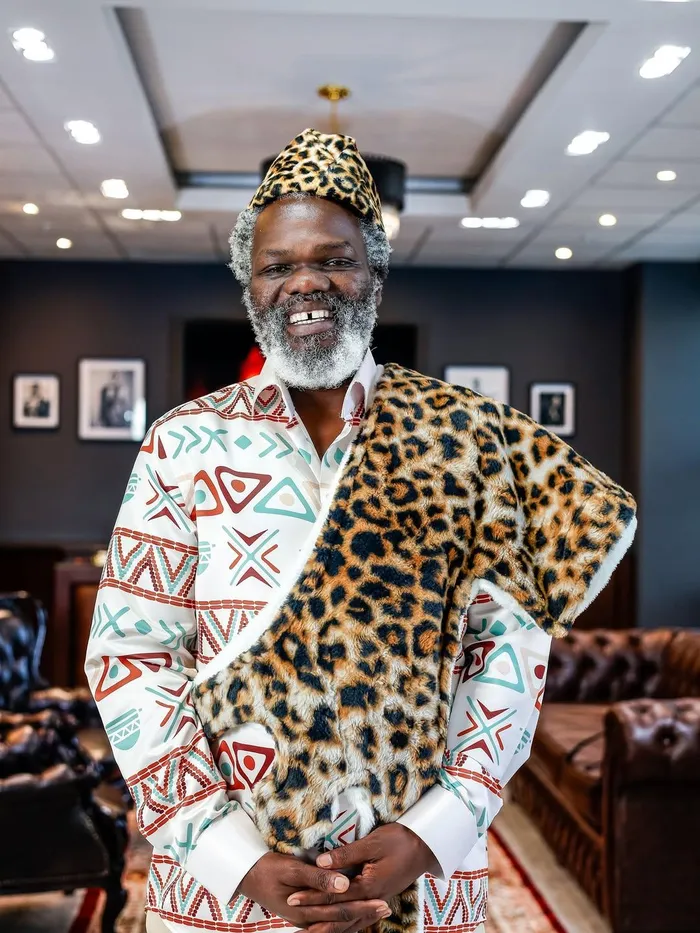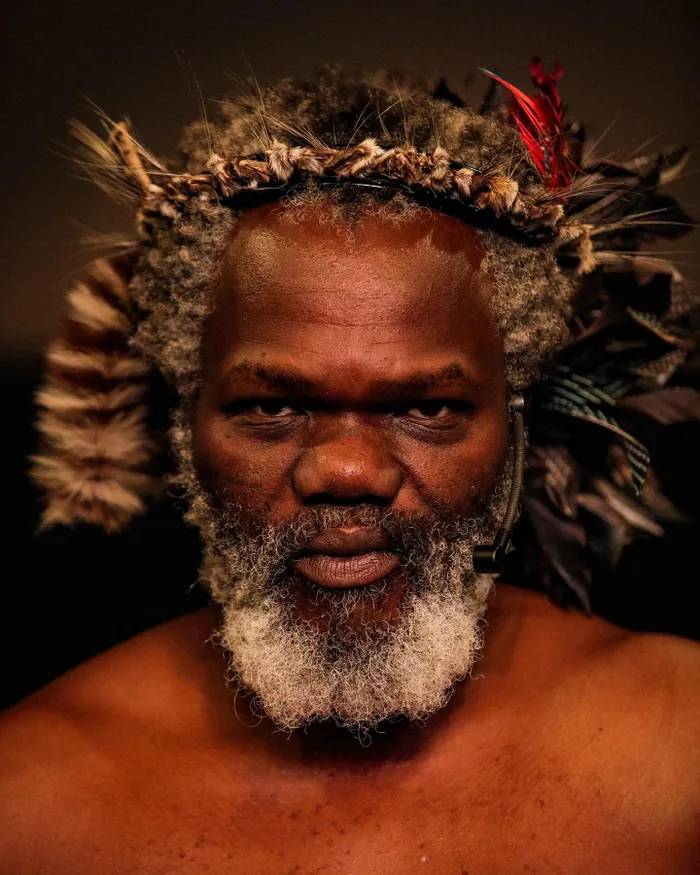Echoes of heritage: how Mbuso Khoza's music heals and inspires hope

When Mbuso Khoza speaks, his words carry the rhythm of history and the weight of tradition, echoing the voices of ancestors while connecting them to the present.
Image: Supplied
When Mbuso Khoza speaks, his words carry the rhythm of history and the weight of tradition.
He is a man who has built his career on music, storytelling, and respect for the cultural knowledge that shaped him.
As he prepares for his Amahubo Symphony concert at Constitution Hill in Johannesburg on September 28, Khoza reflects on his journey, influences, struggles and the vision that continues to guide him.
Khoza’s first encounters with music came from community ceremonies and family life.
“My earliest moments of music were when I saw Amabutho singing at ceremonies and when young girls would practice at uMemulo. Older women also sang lullabies to children. That is how I was inspired.”
Raised in a family that embraced both the Salvation Army and the Nazareth Baptist Church, Khoza was exposed to hymns such as “How Great Thou Art" as well as the distinctive traditions of Shembe worship.
His uncle’s involvement in the church added another layer to this musical exposure. Later, listening to the gospel artist Vuyo Mokoena confirmed for Khoza that music could be more than a passion.
“I wanted to study law and become a magistrate, but music took over,” he recalls. At 22, he moved to Johannesburg, imitating Mokoena until meeting jazz pianist and composer Themba Mkhize, who became another major influence.

Khoza emphasises that his Zulu heritage is inseparable from his music, shaping both its sound and soul.
Image: Supplied
Khoza insists that his Zulu heritage is inseparable from his music.
“The influence of Zulu heritage in my music comes with the expression of language. I grew up in an era where people took pride in using the philosophical aspects of the language and its metaphors."
"When I became a songwriter, I treated history as a record of events and traditions. They shape how I write, how I sound and how I sing.”
Khoza has created soundtracks for some of South Africa’s most important television dramas. His work on "Umkhokha: The Curse” and “Shaka iLembe” required him to balance cultural authenticity with creative composition.
“When Duma Ndlovu called me about ‘Umkhokha’, he said I was the right person because of my Shembe background and linguistic knowledge. I had to respect the church by not copying their songs but by composing music that felt familiar and nostalgic to followers. I researched extensively to reference rhythms and vocal styles.”
His involvement in “Shaka iLembe" was personal.
“My ancestors worked with King Shaka, so some of the history was almost first-hand. When the producers came to the studio, they would brief us about the scenes. Creating the theme song took a lot of debate, but eventually we produced music that captured hope, destiny and Shaka’s journey.”
Khoza’s introduction to film scoring began many years ago when he sang for Leon Schuster’s “Mama Jack”. Later, he worked on international projects and grew into a full-time composer.
“I use very ancient methods to produce melodies. For me, scoring is about honesty and truth. It is about allowing yourself to become a trumpet of the universe.”
For Khoza, music and storytelling are inseparable. He points to the tradition of grandmothers telling bedtime stories, seamlessly moving between narration and song.
“It was never about genius. It was about continuing what our foremothers did. Even in theatre, from Greece to Rome, the rituals were about song and story. Our lullabies were political stories disguised as children’s songs."
"Preserving lullabies and Amahubo, our family songs, is crucial. If we do not document them, people will continue to think our music is demonic or unworthy.”
Acting has also played a role in Khoza’s career. He has also appeared in productions such as “Masinga - The Calling” and “House of Zwide”.
“Acting makes people connect my voice to my face. It gives depth to my identity as an artist. I encourage other musicians to embrace acting or other skills, so we do not remain stuck while younger artists evolve.”
On September 28, Khoza will host the Amahubo Symphony. The concert will showcase traditional family songs, lullabies, prayers and hymns orchestrated for the first time by Siyanda Zulu.
“Western orchestras safeguard the music of Bach and Mozart. Amahubo Symphony will safeguard lullabies, bedtime songs and family prayers. We will present this music in orchestral form so it is preserved for generations.”
The event will also include traditional food to promote community health and discussions about family history and spirituality.
“It will be one of the first of its kind,” Khoza says. “We want to revive identity and promote mental well-being.”

When Mbuso Khoza speaks, his words carry the rhythm of history and the weight of tradition, echoing the voices of ancestors while connecting them to the present.
Image: Supplied
Khoza is encouraged by the growth of South African music but warns against losing depth.
“From mbaqanga to the Mahotella Queens, to kwaito and now amapiano, the journey has been promising. But we need more schools for poetry. Poetry is the medium that allows you to say what cannot be unsaid."
"Without it, songs risk repeating one idea for five minutes. We must check what we are ignoring, because ignorance will shape the future.”
Behind Khoza’s success lies a story of struggle. The uncertainty of a music career without a fixed salary pushed him into depression and debt. At one point, he owed more than R300,000 and considered suicide.
“I felt like killing myself because of debt and the lack of gigs. But when my daughter spoke to me on the phone, I thought about the memory she would be left with. That stopped me. It became my responsibility to live. Those challenges made me stronger.”
Khoza now speaks openly about mental health, using his story to encourage others.
At 47, Khoza says he feels younger than ever. “I have no energy for the past. The future is not here. We only have this moment. My music is about living in this moment fully.”
After the Amahubo Symphony, Khoza will launch the Umsuthu Mental Space project to create dialogues on anxiety and depression.
He is also establishing an arts centre in Johannesburg that will train young people in philosophy, isiZulu language, acting and music theory. Graduates will receive formal certification.
“I am looking for sponsors. This centre is my mission now.”
Khoza’s legacy, he says, must be about truth, kindness and service. “I wish to leave a society shaped by truth and kindness. Every child trained by me must know me for that.”
Lutho Pasiya’s pick on Mbuso Khoza’s top songs to check out:
- “Njomane”: Inspired by Queen Nandi, Shaka’s mother. The song captures her nurturing spirit, struggles and strength as the backbone of her son’s destiny.
- “Mehlo Abonayo”: Translates to “eyes that see”. It calls for spiritual awareness and consciousness, reminding listeners to look beyond the physical and perceive truth with inner vision.
- “Kuyabanda Ngaphandle”: Means “it is cold outside”. A metaphor for loneliness, hardship and emotional distance, urging people to seek warmth in connection and community.
- “Isivikelo” (with Kelly Khumalo): Means “protection”. A spiritual call for divine safeguarding in turbulent times, blending Khoza’s deep vocals with Khumalo’s emotive delivery.
Related Topics: